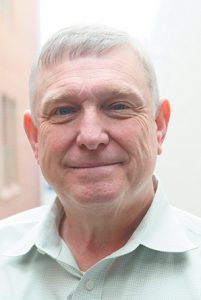By Lonnie Wilkey
Editor, Baptist and Reflector
lwilkey@tnbaptist.org
 LEXINGTON — One of the Tennessee Baptist Mission Board’s newest specialists has a special interest in young people ages 20 to 40, a majority of whom would be classified as “Millennials.”
LEXINGTON — One of the Tennessee Baptist Mission Board’s newest specialists has a special interest in young people ages 20 to 40, a majority of whom would be classified as “Millennials.”
Why? Because at age 29, Ryan Keaton is one of them.
Keaton recently joined the TBMB in the role of emerging generations specialist after serving for 11 years at First Baptist Church, Lexington, where one of his responsibilities was overseeing ministry to young adults. “I see the need of reaching my generation,” he said.
Because of his ministry at First Baptist, Keaton is well aware of the “struggles we had to get young adults connected at First Baptist. I thought this (his new role at TBMB) would be a good opportunity to be a resource to my generation.”
Keaton opined that one of the reasons churches have problems in connecting with young adults is that “by and large churches don’t have specific ministries for this age group.”
He noted that young people who were reared in church always had specific ministries geared toward them — preschool, children and youth.
After they graduate from high school or college, some of them end up in an adult class with their parents, he continued. “They feel they don’t belong or have a specific place.”
He can relate to that age group just out of high school or college. They are no longer “youth” but many adults still view them as “kids,” he observed. “Whether it is real or perceived, they have no place to call their own.”
Another factor in reaching young adults is to realize they have a lot of things battling for their time, Keaton continued.
Keaton recalled a statement attributed to Michael Catt of Sherwood Pictures, “Whoever wants the next generation the most will get them.”
He agrees with that assessment. “The world is definitely competing for their attention,” he affirmed. “There is always going to be something else to spend your time on.”
Keaton offered some suggestions for churches that will enable them to compete for the time of young adults.
Be intentional. Churches need to be intentional in not wasting the time that young adults give to the church. “If young adults feel their time is being wasted, they will not return,” he observed.
As an example, if a young couple attends a Sunday School class and come away thinking it was a glorified history lesson or did not provide illustrations that are relevant to their life, they will look for something else, Keaton said.
Young people are looking for a place where they can connect with others, he continued. “They want face to face interaction and camaraderie.”
 Transition. Keaton also noted churches need to offer natural transition points as young people graduate from high school to college or the workplace. He also said it is important to offer classes or resources as they progress through life — from marriage to parenting classes as they begin having children, etc. “It provides churches the opportunity to have natural connecting points with young adults to help them meet a need the young adult is having,” Keaton said.
Transition. Keaton also noted churches need to offer natural transition points as young people graduate from high school to college or the workplace. He also said it is important to offer classes or resources as they progress through life — from marriage to parenting classes as they begin having children, etc. “It provides churches the opportunity to have natural connecting points with young adults to help them meet a need the young adult is having,” Keaton said.
Provide opportunities to serve. Young adults also want to serve, he said. “This generation wants to know that their attendance will make an impact on not only their lives but the lives of others,” Keaton said.
He noted research from the Barna Group has shown that Millennials are more likely to stay involved in church if they are motivated to serve. He encouraged churches to let young adults know they are valued and to provide leadership opportunities.
Keaton acknowledged that he will also be learning as he works with churches to help them learn to involve young adults in the life and ministry of the church.
Keaton wants to be a resource for all churches in Tennessee, but especially smaller churches that do not have a staff person who focuses on young adults specifically. Any size church can have a ministry geared toward younger adults, he stressed.
“I am grateful that the Tennessee Baptist Mission Board sees the need for this kind of focus and is making an intentional effort to meet those needs,” Keaton said.
“It’s brand new and I am excited to be a part of it,” Keaton said.
Mark Miller, leader of the TBMB’s baptism/discipleship team, noted there is a need for Keaton’s ministry focus.
“Twenty-two percent of the population in Tennessee are between the ages of 18-34. Most of these adults are single, but some are married.
“To win Tennessee, our churches must focus on reaching single and married young adults.
Miller said Keaton knows “the importance of Sunday School, groups, outreach and evangelism to seeing people saved, baptized and discipled. Every church in Tennessee must refocus their efforts in praying, connecting, inviting, sharing, loving, discipling and multiplying to the emerging generation of adults.
“Our passion is to help churches win their harvest field, and churches of all sizes struggle to reach and keep younger adults,” Miller added. B&R — For more information about ministering to young adults, contact Keaton at 629-326-5975 or rkeaton@tnbaptist.org.
MILLENIALS: BY THE NUMBERS
85 percent — Percentage of pastors said they were somewhat or very concerned with the increased amount of screen time among young adults during/after the pandemic (Credit: Barna Research Group)
64 percent — Percentage of young adults who drop out of church after having been active as a child or youth. This number represents a 5 percent increase from just five years earlier. (Credit: Barna Research Group)
23 percent — Percentage of millennials who think what is morally right and wrong depends on what an individual believes (Credit: Barna Research Group)
16 percent — Percentage of churches in America (of every domination) that have a significant young adult population (Credit: Monte Sahlin and David Roozen, “A Profile of Churches and Other Congregations with Significant Young Adult Participation.” )


